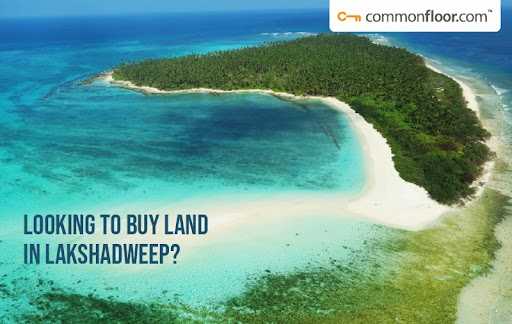Planning to Buy Land in Lakshadweep? Here’s What You Should Know!
The interest in acquiring property on the stunning shores of Lakshadweep has noticeably surged, particularly following the recent turn of events. But before you dream of owning a slice of this paradise, it’s crucial to grasp the nitty-gritty of its geography, local laws, and regulations.
A Brief Introduction to Lakshadweep Islands
Lakshadweep is a group of 36 beautiful islands in the Arabian Sea, known for its stunning landscapes and warm weather.
The habitable islands include Agatti, Bangaram, Benbakula, Kadmat, Kalpeni, Androth, Minicoy, Kavaratti, Suheli, Amini, and Bitra. Among these, Bitra stands out as the smallest, housing approximately 271 individuals as per the census data from 2011.
Lakshadweep is adorned with exotic coral reefs, clear water, and diverse marine life. The climate here is tropical, meaning plenty of sunshine dotted with the occasional rain!
The islands also have a rich cultural tapestry influenced by coastal South Indian and Maldivian customs. People here enjoy a slow-paced life, which is deeply connected with nature and the sea.
Different Types of Properties in Lakshadweep: A Plethora of Investment Opportunities
Here’s a detailed look into what this serene archipelago has to offer to real estate investors.
Residential Properties
The most popular kinds of residential properties are beachfront villas: These luxury properties provide direct ocean views and access, marking them as a prestigious investment. Perfect for luxury rentals or private getaways, beachfront villas showcase the pinnacle of comfort and exclusivity.
Guest Houses and Homestays also form a great investment option. They appeal to budget travelers and culture enthusiasts alike, offering authentic local experiences.
If you’re interested in catering to long-term visitors, you can consider apartments on select islands as they offer a steady income stream. They cater to the growing demand for extended stays and are affordable.
Commercial Ventures
With a wealth of amenities, such as dining, wellness centers, and leisure activities, resorts in Lakshadweep attract a wide audience. They promise high occupancy and robust returns, engaging both international and domestic tourists.
The hotel sector also offers diverse investment scales and properties ranging from high-end to more economical options. This segment benefits significantly from Lakshadweep’s increasing tourist arrivals, ensuring steady business growth.
The restaurants and retail market is also capitalizing on the growing number of visitors seeking culinary and shopping experiences. From traditional cuisine to souvenir shops, these businesses meet the dynamic needs of tourists while presenting compelling investment propositions.
As for investing in land for residential or commercial purposes, you must know that acquiring land may be possible, however, it comes with its own set of challenges and restrictions.
Potential Opportunities
To enrich the allure while preserving its natural beauty, future residential and tourism developments may focus on sustainability and authentic experiences.
This could include limited eco-friendly apartments and villas on islands like Kavaratti for long-term residents. There may also be an expansion of heritage homestays in Amini and Androth to cater to visitors seeking local immersion.
Moreover, proposed tourist attractions encompass environmentally conscious overwater bungalows and responsible diving centers that emphasize reef conservation.
There’s also a plan to expand eco-tourism infrastructure to support snorkeling, birdwatching, and kayaking. All these initiatives are designed to blend well with the islands’ natural environments and local communities.
Construction Rates and Land Prices in Lakshadweep
The average land price in Lakshadweep per square foot is Rs 13,000. The estimated construction cost for a residential property with average-quality finishes and materials is Rs 15.3 lakh. This breaks down to a cost of Rs 1,700 per square foot.
As in the case of a commercial property, a mid-range resort bungalow covering 500 square feet can be built at an estimated cost of Rs 12.5 to 17.5 lakhs, which breaks down to about Rs 2,500 to Rs 3,500 per square foot.
What to Know Before You Buy Land in Lakshadweep?
Before investing in a Lakshadweep project, it’s crucial to consider several key points due to the unique nature of this union territory –
1. Restrictions on Ownership
Non-residents may face stern restrictions on buying property in Lakshadweep due to its status as a tribal area, aimed at preserving the local culture and environment. Understand the legalities surrounding property ownership to ensure eligibility.
The truth is, buying property here isn’t straightforward if you’re not from Lakshadweep. The local laws prioritize the indigenous population. If eligible, you’ll need to navigate through a detailed process to acquire permission from local authorities.
Understanding the local legalities is also crucial, as the government plays a critical role in property transactions here.
2. Environmental Regulations
Given the ecological sensitivity of the islands, stringent environmental regulations are in place. It’s essential to be aware of these guidelines to ensure that any property investment or development complies with eco-friendly practices and conservation laws.
3. Limited Infrastructure
Recognize that Lakshadweep has limited infrastructure compared to mainland India. Accessibility, healthcare, education, and communication services might not be as developed, impacting your living or investment prospects.
4. Climate Vulnerability
As an island territory, Lakshadweep is especially vulnerable to climate change, including rising sea levels and extreme weather events. You must, therefore, consider the long-term environmental risks when investing in property.
5. Limited Market Liquidity
The property market in Lakshadweep may not be as liquid as in other regions. This could affect the ease of selling the property in the future. Thorough market research and an understanding of local demand are also highly recommended.
6. Tourism Regulations
If you’re buying property with the intent of tapping into the tourism sector, it’s important to note that there are regulations aimed at controlling and limiting the impact of tourism on the island’s environment and culture. So, ensure your business plans align with these regulations.
7. Consultation and Legal Advice
Due to the complexity of laws and regulations governing property ownership and development in Lakshadweep, seeking advice from legal experts and consultants who specialize in property law within the territory is crucial.
Step-by-Step Guide to Checking Land Records
Follow the steps outlined below to check the land records in Lakshadweep –
Step 1: Access the Official Website
The first step involves visiting the official website dedicated to Lakshadweep’s Land Records. This portal is designed to provide easy access to land records data for the public.
Step 2: Navigate to ‘Search Land Records’
Once you’re on the homepage, scroll through to find the ‘Search Land Records’ option. This section is specifically designed for users to input details and search for land records online.
Step 3: Enter Property Details
In the search section, you will be required to select specific details pertaining to the property you are interested in.
These details typically include the name of the island, survey number, and sub-division number. Fill in these fields carefully to ensure that you retrieve the correct records.
Step 4: Review the Land Records
After entering the required details and clicking on the search button, the website will display the land records associated with the property in question.
Remember to carefully review these records to understand the property’s history, ownership status, and any other important legal aspects.
For added convenience and record-keeping, it’s advisable to take a printout of these records.
Seize the Best in Lakshadweep!
Investing in properties in the Lakshadweep Islands is a journey that requires patience, respect for local norms, and a deep commitment to environmental and cultural
Although Lakshadweep has lately gained prominence in the headlines, it has long warranted such attention. This newfound attention, albeit delayed, reflects the lasting beauty of its inherent charm.
Ultimately, the spotlight has finally turned to this deserving destination – BETTER LATE THAN NEVER!







